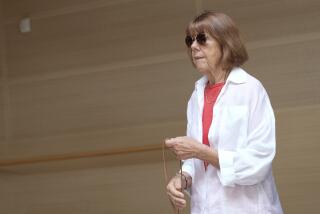Federal authorities get telephone recording linked to Lance Armstrong case
Federal prosecutors have obtained a telephone conversation secretly recorded six years ago by three-time Tour de France champion Greg LeMond in which he and a woman close to Lance Armstrong discuss her being present in 1996 when others say Armstrong told his cancer doctors about his use of performance-enhancing drugs.
The tape recording and transcript of that conversation are expected to be presented to a federal grand jury in Los Angeles looking into charges of widespread drug use in professional cycling, according to sources close to the investigation who are not authorized to speak publicly about it.
Prosecutors have subpoenaed the woman who sources say is Stephanie McIlvain, a longtime liaison to Armstrong for one of his major sponsors, the eyewear company Oakley Inc.
LeMond was calling McIlvain in connection with a separate business dispute he was having with one of his sponsors when he raised the subject of what McIlvain heard in Armstrong’s Indiana hospital room.
About 10 minutes into the tape, LeMond says, “I know what I heard from a source outside of the group here of what, um, happened at the hospital.… I’m not asking you to do anything you would never want to do, but, you know, if I did get down where it was … a lawsuit … would you be willing to testify?”
McIlvain answered: “If I was subpoenaed, I would. … I’m not going to lie. … I was in that room. I heard it. … My whole concern is my loyalties to Oakley. … They say I was never in there. And I know I was in there. You know, I totally know I was in there.”
On the tape, McIlvain asked LeMond whether he is recording the conversation and he said no. The tape was made in July 2004, according to LeMond’s wife, Kathy. Greg LeMond provided the tape and transcript to prosecutors pursuant to a subpoena, along with tens of thousands of documents.
Armstrong, who captured a record seven consecutive Tour de France victories, has repeatedly said he has never used performance-enhancing drugs or participated in blood doping and never told doctors he had used such drugs. He came under renewed fire this past May after Floyd Landis, a former teammate on the now-defunct U.S. Postal Service team, accused Armstrong and a handful of others of systematic doping.
McIlvain, who lives in Orange County, did not return numerous messages left by The Times. Her attorney, Tom Beinart, said this week that, “It’s a shame certain people, including Mr. LeMond, who have an agenda, were attempting to get people to say things that are incriminating. Regardless of their efforts and intent, Ms. McIlvain does not have any evidence that would represent incriminating information about Mr. Armstrong on blood doping or performance-enhancing drugs.”
In a 2005 Texas civil case deposition, McIlvain denied she ever heard Armstrong make any admissions of doping or performance-enhancing drug use.
The account of what Armstrong said to those doctors has been in dispute since 2004, when a book about Armstrong reported that former teammate Frankie Andreu and his wife, Betsy, who were present, said they heard Armstrong’s hospital room admissions. Although others were in the room at the time, including McIlvain, no one else has corroborated the Andreus’ version.
This summer, Betsy Andreu told federal prosecutors and The Times that she thinks McIlvain has been reluctant to substantiate the claim because she does not want to jeopardize her career with Oakley.
Andreu, who said she arranged the LeMond telephone conversation, also has provided federal investigators voice mail recordings allegedly left on her machine by McIlvain in which Andreu says McIlvain acknowledges regret for “lying” in the 2005 Texas civil case deposition.
The grand jury involvement ramps up the pressure on McIlvain, according to one of the sources close to the investigation.
Mark Fabiani, a member of Armstrong’s legal team, said, “Greg LeMond’s illegal tape is the stalest of all the stale news to emerge from this inquiry so far: Ms. McIlvain disavowed this during her 2005 sworn deposition, and Mr. LeMond violated California law when he made the tape in yet another of his pathetic attempts to settle old cycling grudges.”
McIlvain was in California during the conversation with LeMond. California law requires consent by both parties of a recording. Legal expert Laurie Levenson said in federal cases, however, taped conversations can be used as evidence as long as one of the parties — LeMond in this case — is aware of the taping.
lance.pugmire@latimes.com
twitter.com/latimespugmire
Times staff writer Diane Pucin and Times researcher Robin Mayper contributed to this report.
More to Read
Sign up for Essential California
The most important California stories and recommendations in your inbox every morning.
You may occasionally receive promotional content from the Los Angeles Times.








